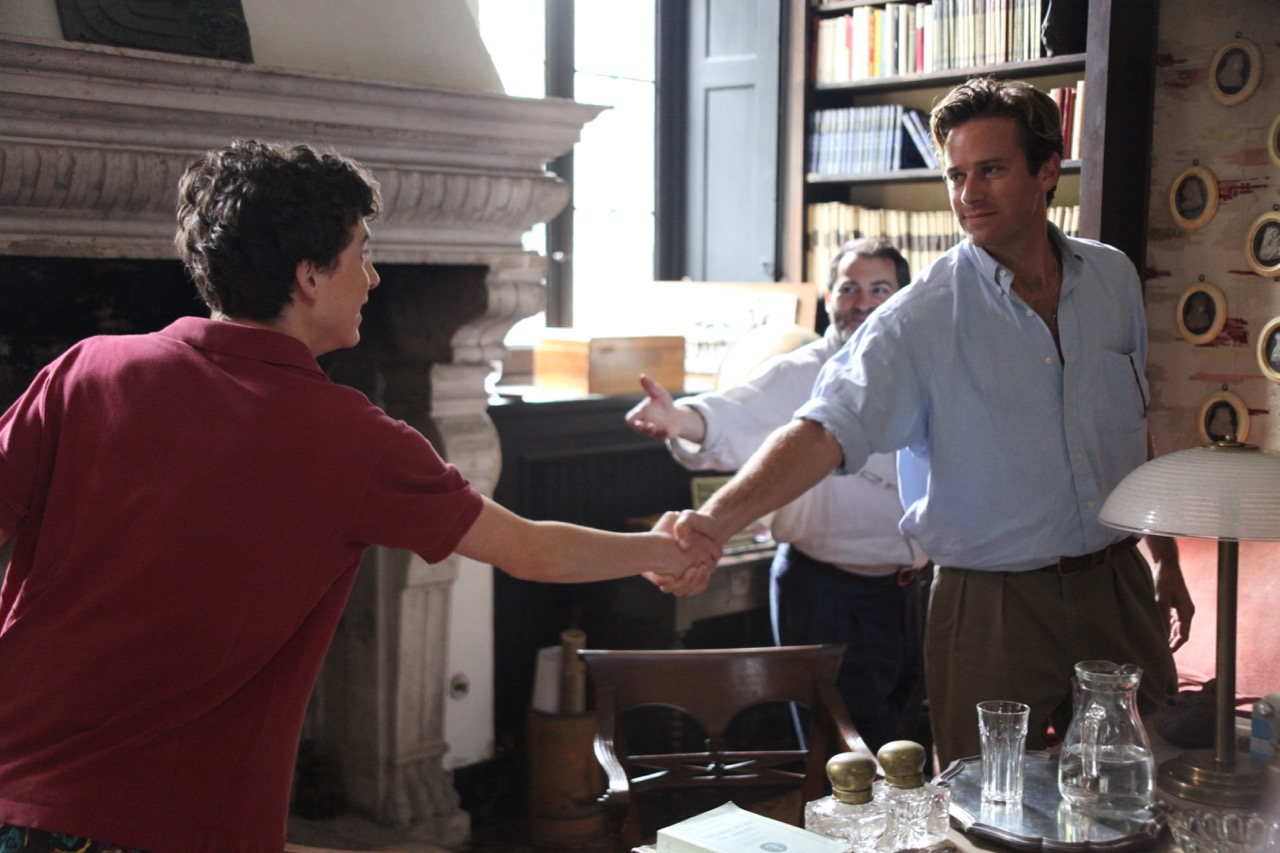 Melissa Anderson
Melissa Anderson
Amore caldo! Director Luca Guadagnino adapts André Aciman’s tale of summer love.

Armie Hammer and Timothée Chalamet in Call Me by Your Name. Photo: Sayombhu Mukdeeprom. Image courtesy Sony Pictures Classics.
Call Me by Your Name, directed by Luca Guadagnino, opening
November 24, 2017, in New York and Los Angeles
• • •
Languor, lust; yearning, yielding: Call Me by Your Name—a sexy, melancholy summer idyll directed by the supreme cine-sybarite Luca Guadagnino—lushly shows how desire is deftly articulated, even when not explicitly labeled or spoken. The title is a carnal directive, pillow talk shared by two same-sex lovers, seventeen-year-old Elio (Timothée Chalamet) and twentysomething Oliver (Armie Hammer). The words gay or homosexual are never uttered in the film; the terms would be redundant, meager for what is so rapturously enacted.
Call Me by Your Name, like Guadagnino’s earlier eros-fueled films I Am Love (2009) and A Bigger Splash (2015), teems with voluptuousness. Each movie is a celebration of hedonism among the affluent and is set wholly or partially in a visually ravishing part of Italy: San Remo, where an unfulfilled haute-bourgeoise wife played by Tilda Swinton ruts al fresco with a younger chef in I Am Love; Pantelleria, a volcanic island off the coast of Sicily that serves as the backdrop for the debauchery of an intergenerational quartet in A Bigger Splash. Opening text in Guadagnino’s latest identifies the location only as “somewhere in northern Italy”; a scan of the press notes reveals that the film was shot in the bucolic town of Crema, where the director himself lives. (The estival glory of the Lombardy region is further showcased by cinematographer Sayombhu Mukdeeprom, who here shoots on 35mm. He’s a frequent collaborator of another sensualist auteur, the Thai filmmaker Apichatpong Weerasethakul.)

Timothée Chalamet and Armie Hammer in Call Me by Your Name. Photo: Sayombhu Mukdeeprom. Image courtesy Sony Pictures Classics.
The change in setting is one of many alterations, both large and small, from the film’s source material, André Aciman’s debut 2007 novel of the same name, which situates the action in an unnamed spot on the Italian Riviera. Aciman’s book is also slightly vague about its exact chronology; all we know is that its central romance takes place “in the mid-eighties.” Guadagnino’s movie, in contrast, assigns a specific year—1983—for its libidinous hot-weather splendor.
These are ultimately superficial amendments, though, for what survives beautifully intact in the page-to-screen transfer is the book’s intricately calibrated mood and tone. A Proust scholar, Aciman structures his novel as Elio’s remembrance of things past. Guadagnino’s film dispenses with that framing device; there is no first-person voice-over (or narration of any kind) looking back from the vantage, and the wisdom, of the present. But a dolorous prolepsis haunts every tender, arousing moment in the movie—instances that are fated to die almost as soon as they’re born. Significantly, Call Me by Your Name was scripted by James Ivory, that longtime paragon, along with his work and life partner Ismail Merchant (who died in 2005), of decorous, mezzo-brow cinema, such as the seemingly countless E.M. Forster adaptations they oversaw in the 1980s and ’90s. Guadagnino’s film may be less sexually explicit and candid than Aciman’s text, which matter-of-factly discusses the next-day physical sensations after anal sex. But Guadagnino never turns the temperature down. The heat generated by, say, an index finger stroking a lower lip—that digit soon to be lightly nibbled and sucked by the mouth it is caressing—could burn a hole through the screen.

Timothée Chalamet in Call Me by Your Name. Photo: Sayombhu Mukdeeprom. Image courtesy Sony Pictures Classics.
Elio first glimpses the young man who will consume him completely from his bedroom window, on the second story of the villa that his Euro-American family—the Perlmans, “Jews of discretion”—occupies during the summer and winter holidays. Oliver, a Heraclitus scholar from the States who proudly sports a Star of David necklace, has arrived for a six-week stay at the Perlman home, a residency that requires him to assist Elio’s dad (Michael Stuhlbarg), a professor of antiquities, with some light administrative tasks. (Oliver’s age is given as twenty-four in the book but never specified in the film.) Peering down with Elio at this tall, exceedingly confident and charismatic visitor is Marzia (Esther Garrel), the teenager’s coeval and friend, sometimes a non-platonic one.
A beloved, precocious only child, Elio may spend his days transcribing and playing Bach and reading Conrad, but certain semaphores convey his contemporary passions: his Talking Heads T-shirt, various posters—one of Peter Gabriel, another, perhaps a little too tellingly, of Robert Mapplethorpe—hanging in his bedroom, which he soon relinquishes to the strapping Yank postdoc. “You’re bigger than your picture,” Professor Perlman says, with a mixture of awe and alarm, to Oliver as soon as he steps out of the cab.

Timothée Chalamet, Michael Stuhlbarg, and Armie Hammer in Call Me by Your Name. Photo: Peter Spears. Image courtesy Sony Pictures Classics.
The adolescent gazes at Oliver—who crashes out, in a jet-lagged stupor, on Elio’s bed with his Converse high-tops still on—with a similar reaction. But at the breakfast table the next morning, when Oliver, in an off-hand comment about his insatiable appetite (for soft-boiled eggs) and his need to curb it, intimates both the enormity of his hunger and a keen self-awareness (“I know myself”), Elio finds that his own ravenousness has been stoked.

Armie Hammer and Timothée Chalamet in Call Me by Your Name. Photo: Sayombhu Mukdeeprom. Image courtesy Sony Pictures Classics.
Most of the first half of Call Me by Your Name captures the ambiguous gestures (Oliver giving a quick shoulder massage to Elio, who initially recoils) and coy flirtation (Elio casually showing off at the piano for Oliver) that feed, if only in slight portions, each young man’s increasing hunger for the other. These signals, some bolder than others, make up an exquisite—but never precious—choreography, leading up to what looks like a Judson Dance pas de deux at the town square, where Elio and Oliver acknowledge their attraction, in, unsurprisingly, the most circumlocutory way: “Are you saying what I think you’re saying?” the older guy asks the younger one.
However evasive their language, their bodies know exactly how to communicate after this initial admission, including when to pause and when to linger. The seconds that precede a deep kiss between Elio and Oliver rank among the sexiest of screen caesuras, a respite during which a spectator is invited to recall similar scenarios she may have found herself in, even while her attention remains focused on the bodies, the lives, the desires of the two men in front of her.
Regarding those bodies: I’ve watched Call Me by Your Name two times, and, to paraphrase the Greek philosopher whom Oliver specializes in, no viewer ever sees the same movie twice. Where Hammer, golden, towering, bronzed, built—a “steak,” to use a colleague’s apt description—struck me as the film’s corporeal center on my initial viewing, the frail, ephebic Chalamet now seems, paradoxically, the movie’s most vital and vigorous figure after the second. What the actor does with his mouth, his eyes, and his breathing rhythms in the movie’s gutting closing scene wordlessly demonstrates the fluency of his multilingual character in another kind of idiom, mastered in a summer-immersion program.
Melissa Anderson is the film editor of 4Columns. From November 2015 until September 2017, she was the senior film critic for the Village Voice. She is a frequent contributor to Artforum and Bookforum.